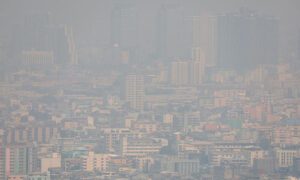Nearly 200 schools in Bangkok had to close on Thursday due to air pollution, according to local officials.
Officials also encouraged people to work from home and banned large vehicles from the city.
Like many other countries in the region, Thailand has long suffered from seasonal air pollution, which is caused by a combination of automobile emissions, smoke from burning crop stubble, and colder, stagnant winter air.
According to IQAir, the Thai capital was the sixth most polluted large metropolis globally as of Thursday morning.
The amount of PM2.5 pollutants, which are tiny enough to enter the bloodstream through the lungs and cause cancer, reached 122 micrograms per cubic meter.
For the majority of the year, the World Health Organisation advises that 24-hour average exposures shouldn’t exceed 15.
Authorities in Bangkok stated earlier this week that schools could decide to close in locations with high PM2.5 levels.
Additionally, thousands of children were impacted as 194 of the 437 schools under the Bangkok Metropolitan Authority’s jurisdiction closed their doors by Friday morning.


The facilities range from kindergartens to secondary schools and the closures last from a day to a week.
Dozens of other schools in the capital are not under BMA authority and figures there were not available.
The figure is the highest number of school closures since 2020, when all schools under BMA authority shut over air pollution.
Earlier this week, authorities encouraged people to work from home, but the scheme is voluntary and has just 100,000 registered participants in a city of some 10 million.
Officials have also limited access for six-wheel trucks in parts of the capital until late Friday.
The government has announced incentives to stop crop stubble burning and is even trialling a novel method to tackle air pollution by spraying cold water or dry ice into the air above the smog.
But the measures have had little impact so far, and opposition politicians have accused Thai Prime Minister Paetongtarn Shinawatra — currently in Davos for the World Economic Forum — of failing to take the issue seriously.





